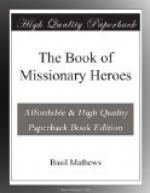“You, as the son of a great chief, must marry other wives,” said old Sekhome, whose wives could not be numbered. Young Khama firmly refused, for the Word of God which ruled his life told him that he must have but one wife. Sekhome foamed with futile rage.
“You must call in the rain-doctors to make rain,” said Sekhome, as the parched earth cracked under the flaming sun. Khama knew that their wild incantations had no power to make rain, but that God alone ruled the heavens. So he refused.
Sekhome now made his last and most fearful attack. He was a witch-doctor and master of the witch-doctors whose ghoulish incantations made the Bamangwato tremble in terror of unseen devils.
One night the persecuted Khama woke at the sound of strange clashing and chanting. Looking out he saw the fitful flame of a fire. Going out from his hut, he saw the lolwapa or court in front of it lit up with weird flames round which the black wizards danced with horns and lions’ teeth clashing about their necks, and with manes of beasts’ hair waving above their horrible faces. As they danced they cast charms into the fire and chanted loathsome spells and terrible curses on Khama. As a boy he had been taught that these witch-doctors had the power to slay or to smite with foul diseases. He would have been more than human if he had not felt a shiver of nameless dread at this lurid and horrible dance of death.
Yet he never hesitated. He strode forward swiftly, anger and contempt on his face, scattering the witch-doctors from his path and leaping full upon their fire of charms, stamped it out and scattered its embers broadcast. The wizards fled into the darkness of the night.
The Fight with the Kaffir Beer
At last Khama’s treacherous old father, Sekhome, died. Khama was acclaimed the supreme chief of all the Bamangwato.[46] He galloped out at the head of his horsemen to pursue Lobengula, the ferocious chief of the Matabele who had struck fear into the Bamangwato for many years. Even Lobengula, who to his dying day carried in his neck a bullet from Khama’s gun, said of him, “The Bamangwato are dogs, but Khama is a man.”
Khama had now freed his people from the terror of the lion, the tyranny of witch-doctors, and the dread of the Matabele. Yet the deadliest enemy of Khama and the most loathsome tyrant of the Bamangwato was still in power,—the strong drink which degrades the African to unspeakable depths.
Even as Khama charged at the head of his men into the breaking ranks of the Matabele, his younger brother, Khamane, whom he had put in charge of his city in his absence, said to the people: “You may brew beer again now.” Many of the people did not obey, but others took the corn of the tribe and brewed beer from it.




